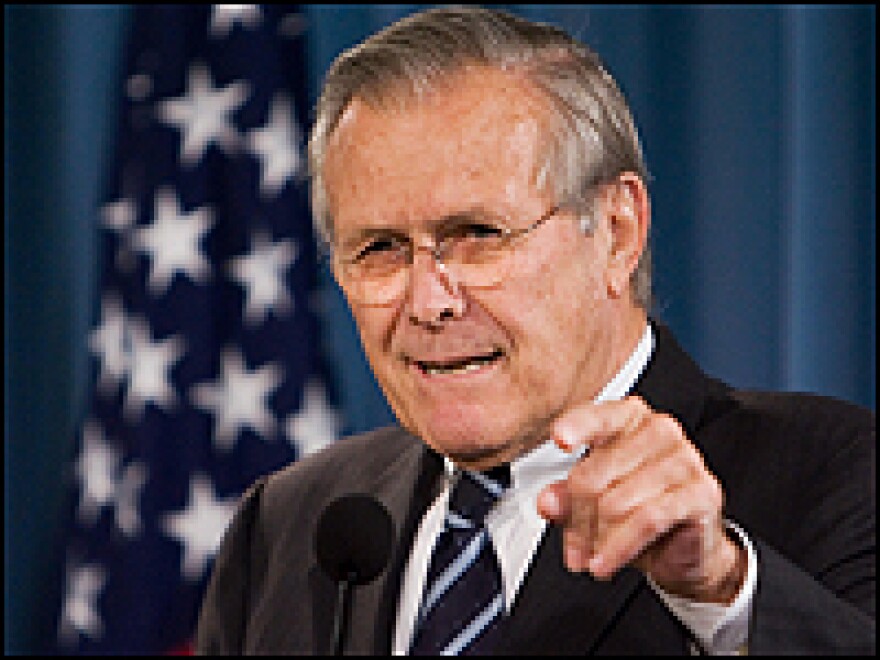
Will a change at the top of the Pentagon lead to a new U.S. approach in Iraq?
"Muted optimism" that the resignation of Defense Secretary Donald Rumsfeld might bring new strategies was buffered in Washington and beyond by concerns that earlier mistakes have put the U.S. military -- stretched thin around the world -- in an untenable position.
As James Dobbins, a national security expert with the Rand Corp., told NPR's Jackie Northam: "We are at this point in a process of damage limitation and of looking for the least-bad alternatives."
President Bush says he remains committed to "victory in Iraq," but in the face of Democratic political advances, he reached out Wednesday to a request for new ideas.
"In coming days and weeks, I and members of my national security team will meet with members of both parties to brief them on latest developments and listen to their views on the way forward," Mr. Bush said.
Many in Washington await the recommendations of the Iraq Study Group -- a bipartisan commission co-chaired by former Sec. of State James Baker and Democrat Lee Hamilton, former chair of the House Committee on International Relations -- which is preparing its report on the war.
But few expect the study group to deliver a bold new direction.
"Jim Baker and Lee Hamilton are very capable men, but I can't believe they have a secret plan that nobody else has thought of for how to extricate ourselves," says Max Boot, senior fellow at Council on Foreign Relations.
In Iraq, concern over the sudden political shift prompted U.S. Ambassador Zalmay Khalilzad to go on state television to assure Iraqis that the United States wasn't going anywhere, NPR's Jamie Tarabay reported.
Still, "Arab pundits speculated what this would mean for U.S. troops in Iraq... would they stay or would they go?" Tarabay said.
Rumsfeld announced he would give up the office he has held for six years, and with it his role of chief architect of the war effort.
Gates will resume his long career in public service -- pending Senate confirmation -- after a 12-year respite in academia. Gates' last government job was as CIA director from 1991-1993, during the previous conflict in the Persian Gulf.
Mr. Bush, Rumsfeld and Gates made a joint appearance at the White House on Wednesday afternoon in a symbolic passing of the torch. Rumsfeld had become a lightning rod for critics worldwide.
"Pentagon insiders say Rumsfeld had been looking for at least a year to leave for a chance to leave on a high note... but the rising tide of public resentment over the war simply made that impossible," NPR's John Hendren reported.
"I recognize that many Americans voted last night to register their displeasure with the lack of progress being made" in Iraq, Mr. Bush said Wednesday afternoon. "Yet I also believe most Americans -- and leaders here in Washington from both political parties -- understand we cannot accept defeat."
In the closing weeks of the campaign, Democrats framed the midterm election as a referendum on President Bush, the war in Iraq and Republican control of Capitol Hill.
Just last week, President Bush said he would stand by his defense secretary for his final two years in office. That became politically impractical the moment Democrats swept away the Republican majority in the House, setting up the threat of endless committee sessions on the conduct of the war in Iraq.
"Clearly, with the Democrats at least in control of the House, Rumsfeld was looking at the next two years spending a lot of time on the Hill, getting some very pointed questions from lawmakers," NPR's Tom Bowman observed. "He would spend mostly all his time on the Hill."
Gates, 63, a longtime friend of the Bush family, has served as president of Texas A&M University since 2002. However, his career in public service spanned four decades, with a focus on national security issues. He joined the CIA in 1966, and served as acting director of the agency during the Reagan administration.
He went on to hold high-ranking posts at the FBI and the National Security Council before returning to head the CIA in 1991 under President George H.W. Bush.
"He's very well regarded in Washington and in Congress," Bowman said of Gates, though he cautioned that confirmation hearings -- required of any Cabinet appointee -- could be used for "a long discussion of mistakes in Iraq."
Rumsfeld, an old ally of Vice President Dick Cheney -- they served together in the Ford administration -- became a somewhat surprising choice for defense chief after President Bush took office in 2001. His combative, often jaunty style at news conferences imprinted itself on the public for good and for bad.
"I don't think there's been a secretary of defense in history who has been in front of the media as much as he has," noted Pentagon press secretary Eric Ruff.
But when public confidence in the war in Iraq began slipping, Rumsfeld became what he might himself have called a "high-value target" for criticism, some of it from within the Republican party.
Before he leaves his post, Rumsfeld will pass Robert McNamara as the longest-serving U.S. defense chief. McNamara's bitter legacy was the Vietnam War. Will Rumsfeld face a similar fate over Iraq?
Iraq war veteran Paul Rieckhoff, a war critic who founded the group now known as Iraq and Afghanistan Veterans of America, told NPR's Northam he thinks so:
"I think Iraq will be the bulk of his legacy," Rieckhoff said. "I don't think history is going to be kind to Rumsfeld, and I don't think it should be."
President Bush offered a different view at Wednesday's news conference announcing Rumsfeld's departure:
"America is safer and the world is more secure because of the service and the leadership of Donald Rumsfeld."
Copyright 2023 NPR. To see more, visit https://www.npr.org.



